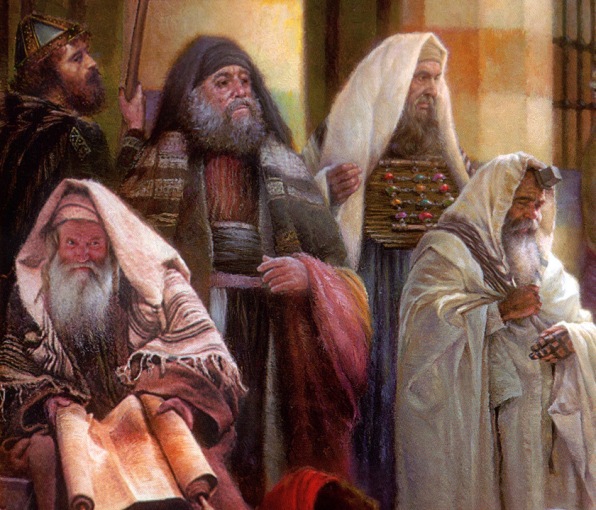DAILY MEDITATION: "... but also to gather into one the dispersed children of God"
Liturgical day: Saturday of the Fifth Week of Lent
 Gospel text (Jn 11,45-56): Today's Gospel (Jn 11:45-56) Many of the Jews who had come to Mary and seen what Jesus had done began to believe in him. But some of them went to the Pharisees and told them what Jesus had done. So the chief priests and the Pharisees convened the Sanhedrin and said, “What are we going to do? This man is performing many signs. If we leave him alone, all will believe in him, and the Romans will come and take away both our land and our nation.” But one of them, Caiaphas, who was high priest that year, said to them, “You know nothing, nor do you consider that it is better for you that one man should die instead of the people, so that the whole nation may not perish.” He did not say this on his own, but since he was high priest for that year, he prophesied that Jesus was going to die for the nation, and not only for the nation, but also to gather into one the dispersed children of God. So from that day on they planned to kill him.
Gospel text (Jn 11,45-56): Today's Gospel (Jn 11:45-56) Many of the Jews who had come to Mary and seen what Jesus had done began to believe in him. But some of them went to the Pharisees and told them what Jesus had done. So the chief priests and the Pharisees convened the Sanhedrin and said, “What are we going to do? This man is performing many signs. If we leave him alone, all will believe in him, and the Romans will come and take away both our land and our nation.” But one of them, Caiaphas, who was high priest that year, said to them, “You know nothing, nor do you consider that it is better for you that one man should die instead of the people, so that the whole nation may not perish.” He did not say this on his own, but since he was high priest for that year, he prophesied that Jesus was going to die for the nation, and not only for the nation, but also to gather into one the dispersed children of God. So from that day on they planned to kill him.
So Jesus no longer walked about in public among the Jews, but he left for the region near the desert, to a town called Ephraim, and there he remained with his disciples.
Now the Passover of the Jews was near, and many went up from the country to Jerusalem before Passover to purify themselves. They looked for Jesus and said to one another as they were in the temple area, “What do you think? That he will not come to the feast? ” For the chief priests and the Pharisees had given orders that if anyone knew where he was, he should inform them, so that they might arrest him.
"Jesus was going to die for the nation, and not only for the nation, but also to gather into one the dispersed children of God"
Fr. Xavier ROMERO i Galdeano
(Cervera, Lleida, Spain)
Today, on his way to Jerusalem, Jesus knew that he was being persecuted, watched, and sentenced. The greater and more revolutionary his revelation—the announcement of the Kingdom—the wider and clearer the division and opposition he encountered among his listeners (cf. Jn 11,45-46).
The negative words of Caiaphas, "It is better for you to have one man die for the people than to have the whole nation destroyed" (Jn 11, 50), Jesus would take positively in the redemption he worked for us. Jesus, the only begotten Son of God, dies on the cross for the love of all! He dies to fulfill the Father's plan, that is, "to gather into one the dispersed children of God" (Jn 11, 52).
And this is the wonder and creativity of our God! Caiaphas, with his sentence ("It is better for you to have one man die...") and out of his hate, does nothing but eliminate an idealist. In contrast, God the Father, in His love for us, sent His Son and did something wonderful: He transformed that malevolent sentence into a work of redemptive love, for every human being is worth all the blood shed by Jesus Christ!
In a week, we will sing the Easter Proclamation in solemn vigil. Through this wonderful prayer, the Church praises the original sin. It does not do so because it is unaware of its gravity, but because God—in His infinite goodness—has worked wonders in response to man's sin. In other words, in response to the "original upset," He responded with the Incarnation, personal immolation, and the institution of the Eucharist. Therefore, next Saturday, the liturgy will sing, "O happy fault, O necessary sin of Adam, which gained for us so great a Redeemer!"
May our sentences, words, and actions not be obstacles to evangelization, for we too have received from Christ the task of gathering the dispersed children of God: "Go and teach all nations" (Mt 28, 19).
Source: evangeli.net

